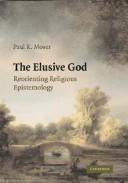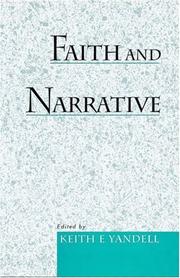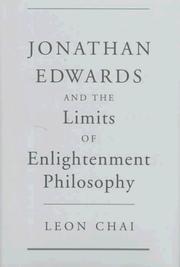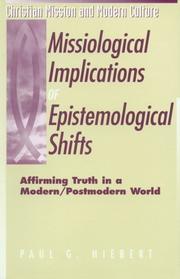| Listing 1 - 10 of 28 | << page >> |
Sort by
|
Book
ISBN: 1281825743 9786611825744 0191562203 9780191562204 0199542651 9780199542659 019954266X 9780199542666 1383045003 Year: 2008 Publisher: New York : Oxford University Press,
Abstract | Keywords | Export | Availability | Bookmark
 Loading...
Loading...Choose an application
- Reference Manager
- EndNote
- RefWorks (Direct export to RefWorks)
This volume offers a snapshot of the state-of-the-art in this longstanding area of philosophy, which has seen an explosive growth of interest over the past half century. The essays are broad-ranging, and as a whole are not specific to any particular creed.
Religion --- Knowledge, Theory of (Religion) --- Epistemology, Religious --- Religious epistemology --- Religious knowledge, Theory of --- Theology, Doctrinal --- Philosophy. --- Philosophy

ISBN: 1107187575 1281383465 9786611383466 0511397666 0511499019 0511396899 0511399251 0511396163 0511398417 0521889030 052112008X 9780511396892 9780511399251 9780521889032 9780511397660 9780511396168 6611383468 9781107187573 9781281383464 9780511499012 9780511398414 Year: 2008 Publisher: New York Cambridge University Press
Abstract | Keywords | Export | Availability | Bookmark
 Loading...
Loading...Choose an application
- Reference Manager
- EndNote
- RefWorks (Direct export to RefWorks)
Three questions motivate this book's account of evidence for the existence of God. First, if God's existence is hidden, why suppose He exists at all? Second, if God exists, why is He hidden, particularly if God seeks to communicate with people? Third, what are the implications of divine hiddenness for philosophy, theology, and religion's supposed knowledge of God? This book answers these questions using a new account of evidence and knowledge of divine reality that challenges scepticism about God's existence. The central thesis is that we should expect evidence of divine reality to be purposively available to humans, that is, available only in a manner suitable to divine purposes in self-revelation. This lesson generates a seismic shift in our understanding of evidence and knowledge of divine reality. The result is a much-needed reorienting of religious epistemology to accommodate the character and purposes of an authoritative, perfectly loving God.
Knowledge, Theory of (Religion) --- Epistemology, Religious --- Religious epistemology --- Religious knowledge, Theory of --- Religion --- Theology, Doctrinal --- Philosophy --- Arts and Humanities
Book
ISBN: 9780521736282 9780521516563 9780511817731 9780511691393 0511691394 0511817738 0521516560 0521736285 0511849478 9780511849473 9786612818493 6612818492 0511689918 9780511689918 0511689179 9780511689178 0511690657 9780511690655 110720657X 128281849X 051169251X Year: 2010 Publisher: Cambridge Cambridge University Press
Abstract | Keywords | Export | Availability | Bookmark
 Loading...
Loading...Choose an application
- Reference Manager
- EndNote
- RefWorks (Direct export to RefWorks)
If God exists, where can we find adequate evidence for God's existence? In this book, Paul Moser offers a perspective on the evidence for God that centers on a morally robust version of theism that is cognitively resilient. The resulting evidence for God is not speculative, abstract, or casual. Rather, it is morally and existentially challenging to humans, as they themselves responsively and willingly become evidence of God's reality in receiving and reflecting God's moral character for others. Moser calls this 'personifying evidence of God,' because it requires the evidence to be personified in an intentional agent - such as a human - and thereby to be inherent evidence of an intentional agent. Contrasting this approach with skepticism, scientific naturalism, fideism, and natural theology, Moser also grapples with the potential problems of divine hiddenness, religious diversity, and vast evil.
Knowledge, Theory of (Religion) --- God --- God (Christianity) --- Proof. --- Epistemology, Religious --- Religious epistemology --- Religious knowledge, Theory of --- Religion --- Theology, Doctrinal --- Christianity --- Trinity --- Philosophy --- Arts and Humanities --- God - Proof.

ISBN: 1280472731 0195351282 1423757580 9781423757580 9780195131451 0195131452 9781280472732 9780195351286 0197739105 Year: 2001 Publisher: Oxford : New York : Oxford University Press,
Abstract | Keywords | Export | Availability | Bookmark
 Loading...
Loading...Choose an application
- Reference Manager
- EndNote
- RefWorks (Direct export to RefWorks)
From novel to anecdote, literary narratives engage and entertain us. Recently, the importance of narrative to ethics and religion has become a pervasive theme, and the essays collected here also focus on narrative's contribution to knowledge.
Storytelling --- Knowledge, Theory of (Religion) --- Epistemology, Religious --- Religious epistemology --- Religious knowledge, Theory of --- Religion --- Theology, Doctrinal --- Religious aspects. --- Philosophy --- Religious aspects

ISBN: 1280471417 0195353110 0585354162 9780585354163 9781280471414 0195120094 9780195120097 0197739784 Year: 1998 Publisher: New York : Oxford University Press,
Abstract | Keywords | Export | Availability | Bookmark
 Loading...
Loading...Choose an application
- Reference Manager
- EndNote
- RefWorks (Direct export to RefWorks)
Jonathan Edwards has most often been considered in the context of the Puritanism of New England. In many ways, however, he was closer to the thinkers of the European Enlightenment. Leon looks at that connection, analyzing Edwards' thought on many issues.
Enlightenment --- Knowledge, Theory of (Religion) --- Knowledge, Theory of --- Epistemology, Religious --- Religious epistemology --- Religious knowledge, Theory of --- Religion --- Theology, Doctrinal --- History --- Philosophy --- Edwards, Jonathan, --- أدوردس، يوناثان --- Enlightenment.
Book
ISBN: 900423148X 1299467989 9781299467989 9789004231481 9789004225640 9004225641 Year: 2013 Publisher: Boston Brill
Abstract | Keywords | Export | Availability | Bookmark
 Loading...
Loading...Choose an application
- Reference Manager
- EndNote
- RefWorks (Direct export to RefWorks)
The interplay between knowledge and religion forms a pivotal component of how early modern individuals and societies understood themselves and their surroundings. Knowledge of the self in pursuit of salvation, humanistic knowledge within a confessional education, as well as inherently subversive knowledge acquired about religion(s) offer instructive instances of this interplay. To these are added essays on medical knowledge in its religious and social contexts, the changing role of imagination in scientific thought, the philosophical and political problems of representation, and attempts to counter Enlightenment criteria of knowledge at the end of the period, serving here as multifaceted studies of the dynamics and shifts in sensitivity and stress in the interplay between knowledge and religion within evolving early modern contexts.
Knowledge, Theory of (Religion) --- Knowledge, Theory of --- Epistemology --- Theory of knowledge --- Philosophy --- Psychology --- Epistemology, Religious --- Religious epistemology --- Religious knowledge, Theory of --- Religion --- Theology, Doctrinal --- History.
Book
ISBN: 1461663423 9781461663423 9781880157626 Year: 1998 Publisher: New York Ardsley House
Abstract | Keywords | Export | Availability | Bookmark
 Loading...
Loading...Choose an application
- Reference Manager
- EndNote
- RefWorks (Direct export to RefWorks)
Western Philosophies Religion
God. --- Knowledge, Theory of (Religion) --- Religion --- Epistemology, Religious --- Religious epistemology --- Religious knowledge, Theory of --- Theology, Doctrinal --- Metaphysics --- Misotheism --- Theism --- Philosophy. --- Philosophy
Book
ISBN: 9401205817 1435644344 9781435644342 9042023945 9789042023949 Year: 2008 Publisher: Amsterdam New York, NY Rodopi
Abstract | Keywords | Export | Availability | Bookmark
 Loading...
Loading...Choose an application
- Reference Manager
- EndNote
- RefWorks (Direct export to RefWorks)
This book illustrates the profound implications of Gabriel Marcel’s unique existentialist approach to epistemology not only for traditional themes in his work concerning ethics and the transcendent, but also for epistemological issues, concerning the objectivity of knowledge, the problem of skepticism, and the nature of non-conceptual knowledge, among others. There are also chapters of dialogue with philosophers, Jacques Maritain and Martin Buber. In focusing on these themes, the book makes a distinctive contribution to the literature on Marcel.
Knowledge, Theory of (Religion) --- Epistemology, Religious --- Religious epistemology --- Religious knowledge, Theory of --- Religion --- Theology, Doctrinal --- Philosophy --- Marcel, Gabriel, --- Ma-sai-erh, --- Marcel, Gabriel Honoré, --- Marselʹ, Gabrielʹ, --- Knowledge, Theory of. --- Epistemology --- Theory of knowledge --- Psychology

ISBN: 1281784303 9786611784300 0567413136 9780567413130 9781563382598 1563382598 9781281784308 6611784306 Year: 1999 Publisher: Harrisburg, Pa. Trinity Press International
Abstract | Keywords | Export | Availability | Bookmark
 Loading...
Loading...Choose an application
- Reference Manager
- EndNote
- RefWorks (Direct export to RefWorks)
This book explores the question of epistemology, or theory of knowledge, and its impact upon how we view and do missions in today's world.What must a new convert know or believe? How do they know? How can we translate and communicate Christian teachings interculturally without distorting the message? How should we do missions in an anti-colonial, postmodern era characterized by religious relativism and accusations of Christian imperialism?In struggling with these questions, Paul Hiebert focuses on the epistemological foundations that underlay them. He examines three specific theories of knowle
Missions --- Philosophy and religion. --- Knowledge, Theory of (Religion) --- Critical realism. --- Philosophy, Modern --- Realism --- Epistemology, Religious --- Religious epistemology --- Religious knowledge, Theory of --- Religion --- Theology, Doctrinal --- Christianity and philosophy --- Religion and philosophy --- Missiology --- Theory. --- Philosophy
Book
ISBN: 1607812797 1607812789 9781607812791 9781607812784 Year: 2014 Publisher: Salt Lake City [Utah]
Abstract | Keywords | Export | Availability | Bookmark
 Loading...
Loading...Choose an application
- Reference Manager
- EndNote
- RefWorks (Direct export to RefWorks)
"The issue of religious authority has long fascinated and ignited scholars across a range of disciplines: history, anthropology, the sociology of religion, and political science. Religious Knowledge, Authority, and Charisma juxtaposes learned authority in early and modern Islam with contemporaneous examples from the Judaic tradition. By illustrating various instances and iterations of authority in historical and cultural contexts
HISTORY / Jewish. --- RELIGION / Islam / History. --- Charisma (Personality trait) --- Authority --- Knowledge, Theory of (Religion) --- Authority (Islam) --- Consensus (Islam) --- Ijmāʻ (Islam) --- Epistemology, Religious --- Religious epistemology --- Religious knowledge, Theory of --- Religion --- Theology, Doctrinal --- Religious aspects --- Judaism --- Islam. --- Judaism. --- Philosophy
| Listing 1 - 10 of 28 | << page >> |
Sort by
|

 Search
Search Feedback
Feedback About UniCat
About UniCat  Help
Help News
News